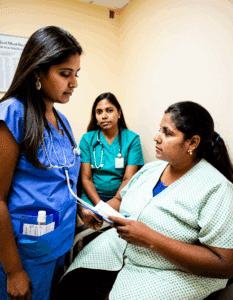Maternal mental health, which reflects a mother’s emotional, social, and mental well-being during and after pregnancy, significantly shapes both the mother’s and the child’s overall health. According to recent data from the Centers for Disease Control and Prevention (CDC), 1 in 8 women struggles with postpartum depression, with half remaining untreated. This makes it imperative to unravel the dynamics affecting maternal mental health, particularly for mothers dealing with or impacted by addiction.
Maternal Mental Health: Understanding the Basics
Maternal mental health refers to the emotional and psychological well-being of mothers throughout pregnancy, childbirth, and the postpartum period. The CDC reports that conditions like depression, anxiety, and substance use disorders are the most frequent complications during these critical phases, affecting 1 in 5 women. The surge of fluctuating hormones can trigger a spectrum of emotions—while many new mothers experience mild mood changes or “baby blues,” some develop more severe mental health issues.
In understanding perinatal mental health, which encompasses the time around childbirth and up to two years postpartum, it’s essential to note the profound impact it has. Severe mental health conditions might lead a mother to even contemplate suicide, further influencing the family’s overall well-being and the child’s development.
The Impact of Addiction on Maternal Mental Health
Understanding the Connection
Addiction amplifies the complexities of maternal mental health beyond mere physical confinement. Whether a mother grapples with her own substance use or the turmoil accompanying a child’s addiction, the ramification is extensive. Substance abuse exacerbates stress, anxiety, and mood disorders. Research by the National Institute on Drug Abuse (NIDA) points out that mothers entangled in addiction face elevated risks of crippling mental health issues like depression and chronic anxiety.
It’s not just the person struggling with addiction who suffers; the entire family is affected. Mothers endure immense emotional burdens—managing household responsibilities while nurturing their children often feels insurmountable. Resources on rebuilding after addiction highlight the critical need for mothers to seek and get appropriate support during these challenging times.
| Aspect | Details | |
| Definition | Maternal mental health refers to a mother’s overall emotional, social, and mental well-being, both during and after pregnancy. | |
| Prevalence | – 1 in 8 women experience postpartum depression. – 1 in 5 women experience mental health or substance use disorder during the perinatal period. |
|
| Untreated Cases | 50% of women with postpartum depression are untreated. | |
| Common Conditions | – Depression – Anxiety – Substance Use Disorder |
|
| Symptoms | – Continuous depressed mood – Crying – Overwhelming tiredness – Intense irritability and anger – Withdrawal from family and friends – Less interest in activities – Difficulty bonding with or caring for the baby |
|
| Triggers | – Fluctuating hormones – Physical changes during and after pregnancy |
|
| Impacts on Children | Negative effects on children’s growth and development due to mothers’ inability to function properly. | |
| Terminology | – Perinatal Mental Health: Mental health during pregnancy and up to two years after birth. – Maternal Mental Health: Same as above. |
|
| Statistics by CDC | – 4 in 5 new parents experience mild mood changes. – 1 in 5 new parents develop serious mental health issues. |
|
| Risk Factors | – Feeling different in the perinatal period – Marital satisfaction – Relationship with in-laws and friends – Underlying diseases – Use of birth control pills |
|
| Severe Cases | Can lead to suicide; inability to care for oneself or the baby, resulting in negative impacts on children. | |
| Special Days | First Wednesday of May is World Maternal Mental Health Day. | |
| Recommended Interventions | – Establish federal policies to promote perinatal mental health and well-being. – Focus on reducing disparities. – Promote multidisciplinary care models. |
|
| Overlap with Fathers | –not mentioned explicitly; focus is primarily on mothers, but awareness about paternal mental health is growing. |
Strategies for Supporting Maternal Mental Health in the Context of Addiction
Therapeutic Approaches
Family Support Dynamics
The Role of Community and Healthcare in Maternal Mental Health
Community Programs
Healthcare Provider Initiatives
The Role of Self-Care in Maternal Mental Health
Practical Self-Care Strategies
Promoting self-care for mothers is vital in maintaining their mental health equilibrium. It’s not a luxury but a necessity, ensuring they can continue to care for their families effectively.
Recognizing and Addressing Postpartum Depression
Symptoms and Red Flags
Effective Treatments
Given that untreated postpartum depression affects many mothers, recognizing these symptoms early and seeking timely help is crucial. MAA provides resources for co-parenting with an addict, emphasizing the importance of support networks.
Innovative Perspectives on Maternal Mental Health in 2024
The Future of Mental Health Apps
Digital solutions like Calm and Headspace are revolutionizing mental health care by offering accessible mindfulness and meditation practices. Services such as Talkspace extend online therapy options, providing mothers flexibility in obtaining mental health support.
Emerging Research and Trends
Contemporary research is delving into the roles of diet, the gut-brain connection, and genetic predisposition on maternal mental health. Nutrition and microbiome health are emerging as pivotal factors in developing future maternal mental health strategies.
Looking Forward: Prioritizing Maternal Mental Health
Maternal mental health needs a holistic approach encompassing therapeutic strategies, community support, digital tools, and cutting-edge research insights. By integrating these elements, we can forge a brighter, healthier future for mothers and their families. Through comprehensive, empathetic assistance and resourceful platforms like MAA, we allevate the burdens mothers face and foster an environment nurturing to their mental health.
Supporting maternal mental health is more than an initiative; it’s an imperative that holds the key to thriving families and communities. Let’s champion this cause together.
Relevant Resources:
– Casting Black– Brandon Van grack– Prestamos Personales sin credito– Mjf Aew– Escorts Maine– Self-care For Mothers– Rebuilding after addiction– Co-parenting With an addict
Maternal Mental Health
Understanding maternal mental health is incredibly important, especially for parents working through the trials of addiction. Did you know that around 70% of mothers experience some form of postpartum mood disturbance? It’s staggering, right? Many people are aware of postpartum depression, but few know that there’s a spectrum of mood disorders affecting mothers,( ranging from anxiety to psychosis. These conditions can profoundly impact a mother’s well-being and her ability to care for her child.
Amazing Facts on Maternal Mental Health
Here’s a fascinating tidbit: the bond between maternal mental health and child development can’t be overstated. In fact, studies show that infants of mothers with untreated depression can face delays in language and cognitive development. This link makes it vital to support mothers in recognizing and seeking help for postpartum depression.( Maternal mental health services play a critical role in breaking this cycle and promoting better outcomes for both the mother and child’s future.
Trivia and Intriguing Insights
Did you ever think about how maternal mental health might influence a mother’s approach to sleep? Well, it’s true, and interesting! When struggling mentally, mothers often report disrupted sleep patterns( that can exacerbate stress and depression. Sleep deprivation isn’t just a challenge for newborns but extends significantly to mothers as well. So, improving maternal mental health can actually help enhance a family’s overall sleep quality.
Here’s Something Fascinating
You probably wouldn’t guess it, but maternal mental health also touches on the unexpected topic of physical health. According to research, mothers grappling with mental health issues are more likely to experience more severe physical health problems. Issues like chronic pain, high blood pressure, and autoimmune disorders have been correlated with maternal stress and depression.( So, addressing mental health is literally life-changing and lifesaving.
By shedding light on these lesser-known facets of maternal mental health, we hope to empower mothers and families with the knowledge and resources they need.

What are the mental health issues of mothers?
Mothers can experience a variety of mental health issues such as depression, anxiety, and substance use disorder during and after pregnancy. These conditions are some of the most prominent complications of this period, affecting 1 in 5 women.
How to deal with maternal mental health?
Dealing with maternal mental health involves seeking support from loved ones and professionals. Therapy, medication, and support groups can make a big difference. Early intervention and continuous care are key to improving outcomes.
How does pregnancy affect a woman’s mental health?
Pregnancy can trigger not just physical changes but also impact a woman’s mental well-being due to fluctuating hormones. This period can see mild mood changes in 4 out of 5 new parents, while 1 in 5 might develop more serious issues like depression or anxiety.
What is the difference between maternal and perinatal mental health?
Maternal mental health refers to mental well-being during pregnancy and after childbirth, up to two years. Perinatal mental health has a broader scope, covering the whole period around birth.
What is depleted mother syndrome?
Depleted mother syndrome isn’t a formal medical term but generally refers to extreme exhaustion and burnout moms feel from the constant demands of childcare, often exacerbated by lack of support and sleep.
What do mothers struggle with the most?
Many mothers struggle with balancing taking care of their child and managing their mental health. Continuous tiredness, lack of support, and societal pressures can make them feel overwhelmed and isolated.
What is maternal anxiety disorder?
Maternal anxiety disorder involves excessive worry and fear related to the pregnancy or baby that disrupts daily life. It can be as common as depression during and after pregnancy and may even occur together with it.
What is maternal psychological distress?
Maternal psychological distress includes symptoms like continuous sadness, irritability, tiredness, and withdrawal from loved ones. It can severely affect a mother’s ability to function and connect with her baby.
What causes maternal psychosis?
Maternal psychosis can be caused by severe postpartum depression, hormonal imbalances, or a pre-existing mental health condition. It may result in hallucinations, delusions, or thoughts of harming oneself or the baby.
Why am I so angry at my boyfriend while pregnant?
Feeling angry at your boyfriend while pregnant can happen due to hormonal changes causing heightened emotions and sensitivity. It’s also common to feel stressed about the future and changes in your relationship.
What are signs you should stop working while pregnant?
Signs you should stop working while pregnant include extreme fatigue, constant stress, physical complications, or advice from your healthcare provider. It’s important to listen to your body and medical advice.
Does arguing while pregnant affect a baby?
Arguing while pregnant can affect a baby by causing stress and anxiety, which may impact the baby’s development. Maintaining a calm and supportive environment is crucial for both the mother and baby.
What are red flags in perinatal mental health?
Red flags in perinatal mental health include persistent sadness, anxiety, trouble bonding with the baby, withdrawal from loved ones, and thoughts of self-harm or harm to the baby. Seeking help early is critical.
How to improve maternal mental health?
Improving maternal mental health involves maintaining a support network, taking time for self-care, and seeking professional help when needed. Healthy nutrition, exercise, and sleep are also essential.
What causes maternal mental health?
Maternal mental health issues often arise from hormonal changes, lack of sleep, societal pressures, and lack of support. Early detection and comprehensive care are vital.
What are common mommy issues?
Common mommy issues include feelings of guilt, relentless stress from managing household and childcare duties, and pressure to meet societal standards. It’s important to seek support and prioritize self-care.
What are common mental health issues in parents?
Common mental health issues in parents are depression, anxiety, and stress related to parenting responsibilities and work-life balance. Seeking help and creating a supportive environment can aid in managing these challenges.
What mental health issues do working mothers have?
Working mothers often experience constant tiredness, stress from juggling work and family duties, and feelings of guilt for not spending enough time with their children. Balance and support are key.
What are the health issues of mothers?
Health issues for mothers include physical complications from childbirth, like recovery from cesarean sections or vaginal deliveries, and mental health issues like postpartum depression and anxiety. Proper medical and emotional care is essential.




























